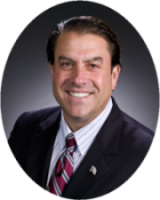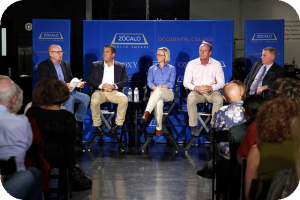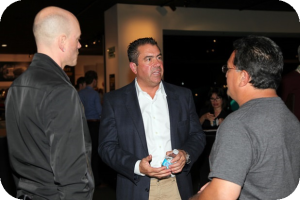Providing local water retailers with a reliable,
high-quality water supply for 81 years
President's Message - Future of Water Reuse in California
 Shawn Dewane
Shawn Dewane
Last month, I had the pleasure of participating on a panel to discuss the future
of water reuse in California. It was a Zócalo Public Square event co-presented by
Occidental College and held at the Petersen Automotive Museum in Los Angeles. My
fellow panelists included Ron Wildermuth, public information and conservation manager
of the West Basin Municipal Water District; Scott Slater, president and CEO of Cadiz
Inc., a company that plans to capture groundwater in eastern San Bernardino County
and sell it to Southern California cities; and Sarah Woolf, president of the water
management company Water Wise, who also works in her family's San Joaquin Valley
farm business. The audience was a diverse group of more than 150 people from Los
Angeles and Orange counties who came to hear about possible solutions to reoccurring
droughts in Southern California.
We discussed the demands of water in the state and how each demand has valid points.
Then, we had the opportunity to discuss the many advances in technology to meet
those water demands, such as OCWD's Groundwater Replenishment System (GWRS).
While water reuse is drought resilient, cost effective and environmentally safe,
we still have to look for other ways to become more self-sufficient in light of
drought conditions and the challenges of procuring cost-effective and reliable water.
Some of those options include water-use efficiency, desalination and water transfers.
 (left to right) Sierra Magazine Editor-in-Chief
(left to right) Sierra Magazine Editor-in-Chief
and Occidental College Adjunct Professor
Bob Sipchen, OCWD Board President Shawn
Dewane, Water Wise President Sarah Woolf,
President and CEO of Cadiz Inc. Scott Slater,
and Public Information and Conservation
Manager of West Basin Municipal Water
District Ron Wildermuth. Photo courtesy of
Zócalo Public Square.
At the Zócalo event, we talked about the need to diversify our water portfolios
and the challenges and politics that come along with trying to do something new
and different, such as exploring the science and technology of desalination that
is used in other parts of the world. It may or may not be a viable option for all
coastal communities, but water leaders must be open and receptive to exploring it
and other water supply options. Fifteen years ago, people were adamantly opposed
to water reuse. Fast forward to 2014. It is widely accepted and proven as a safe
water supply, and advances in technology have made it economical and more energy
efficient.
While I am very pleased Zócalo and other media outlets have taken a greater interest
in putting the spotlight on water reuse, I am still disappointed and concerned that
the media still chooses to use phrases like "toilet to tap" and "yuck
factor" when trying to draw viewers to their stories. I understand the need
to capture the audiences' attention amidst so much competing media outlets,
but, unfortunately, it lends to some people fixating on the water source rather
than the exceptional quality of the end product, making our jobs as water planners
more difficult to get communities to support water reuse.
When Zócalo was promoting the event, it chose to use a toilet image and even, dare
I say, use the word "urine". After sharing with them our concerns and
hearing the panel, I am pleased and relieved to know that their recap of the event
has a softer title: "What Drought? California Has Plenty of Water. Looking
to a Future Where We Drink More Wastewater and Ocean Water - Treated, Of Course."
It could still use some work, but it is a step in the right direction. Its journalists
were open and receptive to learning about water reuse and now have a better understanding
about how their choice of words can help make or break future water reuse projects
in Los Angeles and around the world. They also challenged us to come up with a better
headline to help journalists draw people into wanting to read more about water reuse
...and water projects in general.
 President Dewane chats with Zócalo guests.
President Dewane chats with Zócalo guests.
Photo courtesy of Zócalo Public Square.
I learned a lot from Zócalo's engaging style of journalism, which is part of
a project of the Center for Social Cohesion at Arizona State University, my alma
mater. I was impressed by the live event, driven by social media promotion, that
wasn't a bunch of talking heads touting their projects. In a unique social setting,
the event was moderator-driven with great questions from Sierra Magazine Editor-in-Chief
and Occidental College Adjunct Professor Bob Sipchen and the audience. To learn
more about Zócalo Public Square's water series or to view the panel discussion,
please visit
What Drought? California Has Plenty of Water.
Lee Kuan Yew Water Prize Video Features Assemblymember Travis Allen
Last month we shared with you information about OCWD receiving the prestigious Lee
Kuan Yew Water Prize for pioneering work in groundwater management and water reclamation,
using advanced water reuse technologies, and for our outreach efforts. This month,
we're happy to provide the introduction video of the 2014 Prize. A special thank
you goes out to Assemblymember Travis Allen (R-Huntington Beach) who opens the
video
with congratulatory remarks. OCWD truly appreciates his kind words and support of
its projects.
GWRS Back Online
OCWD staff has concluded inspection of the interior of the Groundwater Replenishment
System final product water pipeline, and repair work is now complete.
Having the GWRS offline for 21 days was part of the GWRS Initial Expansion construction
project that will provide 30 million more gallons of water per day (from 70 million
gallons per day currently to 100 million gallons per day) to OCWD's groundwater
basin by spring 2015.
While the plant was offline, OCWD staff, with the help of a general contractor,
was able to perform a thorough inspection of the GWRS pipeline. Most of the GWRS
pipeline had never been inspected since it was first constructed more than six years
ago. In order to properly check the pipeline for signs of degradation of its internal
lining, staff had to make an entry into the pipeline at several locations. This
required participation from several OCWD departments including engineering, maintenance,
instrumentation and electrical, operations, and most importantly the barrier operations
group.
In addition, while the plant was offline the GWRS Initial Expansion contractor was
able to tie in all major piping required to provide water to the new treatment equipment.
This work also required a huge effort by OCWD staff from several departments to
safely prepare the plant's piping and electrical systems for the contractor's
employees to perform their required work.
During the 21-day offline period, OCWD staff was able to perform many preventative
maintenance activities and install 2,100 new membrane elements in two of the 15
reverse osmosis units. Finally, a large, several-day effort was required to bring
the plant and pipeline back online. The plant had never been down for this long
so the restart was complex, requiring close coordination with the Orange County
Sanitation District, OCWD's partner in the construction of the GWRS.
"The GWRS pipeline inspection work and the effort to allow the initial expansion
contractor to complete work would not have been successfully achieved without the
dedication of the OCWD staff. I'd like to thank them for their tireless effort,"
says GWRS Program Manager Mehul Patel.
Measuring Groundwater Levels - A United Effort
OCWD manages the groundwater basin that provides reliable, high-quality water to
19 special and municipal water districts that serve 2.4 million customers in north
and central Orange County.
Groundwater levels are measured in wells throughout the Basin during the last week
of June and first week of July of every year. OCWD does this to ensure we have representative
groundwater conditions at the end of the water year (June 30). It takes a special
coordinated effort across multiple departments (Hydrogeology, Water Quality, and
Barrier Operations) to coordinate and carry out these field measurements—all within
a two-week window. In addition, groundwater producers measure water levels for their
own production wells and report them to OCWD.
Why do we do this?
We do this to determine the amount of groundwater in storage as well as the change
in groundwater storage from the prior water year. The groundwater storage calculations
provide the technical basis for basin management decisions each year, such as setting
the Basin Production Percentage (BPP) and determining the amount of replenishment
water to purchase, thus allowing the District to sustainably manage the Basin over
the long term.
Environmental Specialist Patrick Hollinden (standing) and Senior Environmental Technician
Jim Caver measure groundwater levels at one of 329 wells.
Setting BPP for Water Year 2014-2015
OCWD has established a BPP of 72 percent, which would provide for about 326,000
acre-feet of groundwater pumping during the fiscal year (FY) 2014-15.
History of BPP
Faced with the county's population explosion during the 1960s, OCWD saw the
need for District water retailers (Producers) to supplement their groundwater extractions
with direct purchase of imported supplies. In 1968, the District Act was amended
to give OCWD the authority to issue incentives to Producers for precisely that purpose.
The District's Board of Directors began setting an annual Basin Production Percentage,
specifying the proportion of total demand to be produced from the basin during the
year. In conjunction with this, the Board established an annual basin equity assessment
(BEA) to reward pumpers who extracted less and penalize those who took more than
the Board requested.
So, if you live in north or central Orange County, this year, 72 percent of your
water supply will be local from the groundwater basin, with an additional 28 percent
coming from Northern California and the Colorado River.
Wehner Chairs Foundation Teleconference
Assistant General Manager Mike Wehner recently chaired the teleconference of the
Tailored Collaboration Review Committee for the Water Research Foundation (WRF).
The committee is responsible for reviewing and approving funding for collaborative
project proposals that serve the water industry. The Water Research Foundation,
each year, funds $1 million in projects. Tailored Collaboration candidates must
be utility subscribers and must match the funds received, which can be upwards to
$100,000. OCWD has been a past recipient of WRF awards and District staff has been
involved in numerous projects of interest to OCWD that have received funding.
Mike and his committee approved a project that seeks to determine the most efficient
methods to disinfect water using ozone and to minimize unanticipated consequences
of the processes. The project is supported by several utilities in the U.S. and
Canada, including Southern Nevada Water Authority and the Metropolitan Water District
of Southern California.
Mike, as chair, is serving his sixth and final year as a Tailored Collaboration
Review Committee member. District Research, Operations and Water Quality staff members
have, additionally, served on WRF project advisory committees through the years.
Many of OCWD's staff members are called upon to serve as expert panelists and
speakers as part of other important research studies and conferences worldwide,
as well.
"By serving with others in the spirit of collaboration, we serve the water
industry at large," says Mike.
OCWD Staff Gets Behind-the-Scenes Look at Weymouth Water Treatment Plant
OCWD staff, led by Don Houlihan, supervisor of Recharge Operations, recently received
an in-depth tour of Metropolitan Water District's (MWD) Weymouth Water Treatment
Plant and its repair shops. MWD's repair facilities at Weymouth serve its entire
Southern California system and are impressive in scale. Its pumping and hydraulic
control systems are large and unique to it and other similar operators like the
State Water Project. Because of their uniqueness and their need for sustainable
operations, MWD has developed considerable in-house capability to manufacture and
repair large water system components.
OCWD staff is constantly seeking opportunities to enhance the District's complex
recharge system, which is recognized as a model for groundwater management. Staff
found the tour very valuable and came away with good ideas on how it might improve
its own fabrication and repair shops following MWD's example, albeit at a smaller
scale.
OCWD's Ongoing Commitment to Ensure High-Quality Water
Senior Laboratory and Water Quality department staff members were among the hundreds
of water utilities, laboratories, and government agencies learning the most recent
updates about the Unregulated Contaminant Monitoring Rule (UCMR) for Public Water
Systems. The U.S. Environmental Protection Agency (USEPA) Office of Ground Water
and Drinking Water hosted the 8-hour webinar and public meeting at Arlington, Va.,
on June 25, 2014.
The purpose of the webinar was to update stakeholders on the progress of UCMR3 to
date, and to communicate the planning process for UCMR4, which is expected to begin
in 2017. OCWD's Water Quality Department and Lab are currently in the middle
of the three-year monitoring and data entry phase of UCMR 3 (from 2013 to 2015),
representing one of only three public agency laboratories in the nation implementing
the full UCMR3 program.
The UCMR Program is mandated by the USEPA for large drinking water distribution
systems and exists to further protect the public's health. It develops a list
of contaminants every five years and collects occurrence data for suspected drinking
water contaminants that don't have health-based standards set under the Safe
Drinking Water Act. This information is then used to support future regulatory decision-making
for the public's safety and supports the administrator's determination of
whether (or not) to regulate a contaminant listed in the UCMR Program.
Out in the Community
Outreach at Fountain Valley's Summerfest - Public
Affairs members staffed a booth at the annual Fountain Valley Summerfest in June
to share information about OCWD's accomplishments, its O.C. Water Hero Program,
facility tours, and about receiving this newsletter. Shown is OCWD Communications
Specialist Crystal Nettles.
Presentation in Fullerton - General Manager Mike Markus,
Chief Hydrogeologist Roy Herndon, and Senior Communications Specialist Diane Pinnick
attended the City of Fullerton Council Meeting where Mike gave an update on the
North Basin Groundwater Protection Plan to approximately 50 participants.
Presentation in Santa Ana - OCWD Director Vincent Sarmiento
and Public Affairs staff attended the Delhi Association Meeting where Director Sarmiento
(who is also a City of Santa Ana Councilmember) gave an update on the South Basin
Groundwater Protection Plan in both English and in Spanish to about 30 participants.
In the News:
- Director of Water Production Bill Dunivin was interviewed for an article about
the GWRS that will be featured in Treatment Plant Operator
magazine.
- A reporter from KNX 1070 Newsradio interviewed GWRS Program Manager Mehul Patel
about the Groundwater Replenishment System. The interview will be part of a larger
segment scheduled to run in late July about California's drought called Running on Empty.
New Employees
Please join us in welcoming the following new employees for 2014:
|
|
Hire Date
|
|
Vivian Lam, Accounting Intern
|
7/1/14
|
|
Eugene Chae, Chemist
|
6/23/14
|
|
Diane Pinnick, Senior Communications Specialist
|
6/16/14
|
|
Crystal Nettles, Communications Specialist
|
6/16/14
|
|
Raul Gonzalez, Regulatory & Water Production Intern
|
6/3/14
|
|
Andrew Espinosa, Warehouse Technician
|
5/21/14
|
|
Liliana Machuca, Temporary HR Clerk
|
4/23/14
|
|
Andrew Kwon, Environmental Health & Safety Intern
|
3/17/14
|
|
Andrew Grabow, R&D Field Intern
|
2/24/14
|
June Tours and Fiscal Year Tour Recap
During the fiscal year 2013-2014, the Groundwater Replenishment System (GWRS) and
the Advanced Water Quality Assurance Laboratory continued to draw large numbers
of guests from around the world. The District conducted 198 tours for nearly 3,432
guests.
OCWD was honored to host 139 tour attendees in June 2014. The following is a list
of those tours: Two groups from Godinez High School, K-Water delegates from the
Republic of Korea and Trojan UV staff members, City of Stanton Public Works Director
Allan Rigg, San Bernardino College students, staff from the Ventura County Watershed
Protection District with a visiting water resources engineer from Iran, and representatives
from the Air & Waste Management Association.
Public tours of the Groundwater Replenishment System are offered at
10 a.m. on the first Friday of every month; reservations are required. Tours may be scheduled for other days of the week, depending on staff availability. To schedule a tour or to request more information, please contact Becky Mudd at (714) 378-3362 or
bmudd@ocwd.com. To schedule a speaker, please contact Rose Wilke at (714) 378-3206 or
rwilke@ocwd.com. You may also visit
www.ocwd.com to schedule these activities online.
CONTACT US
www.ocwd.com
18700 Ward Street
Fountain Valley, CA 92708
(714) 378-3200
info@ocwd.com
You are receiving this email from the Orange County Water District. If you would like to be removed from OCWD's email list, please respond to this email with "Unsubscribe" in the subject line. Thank you.